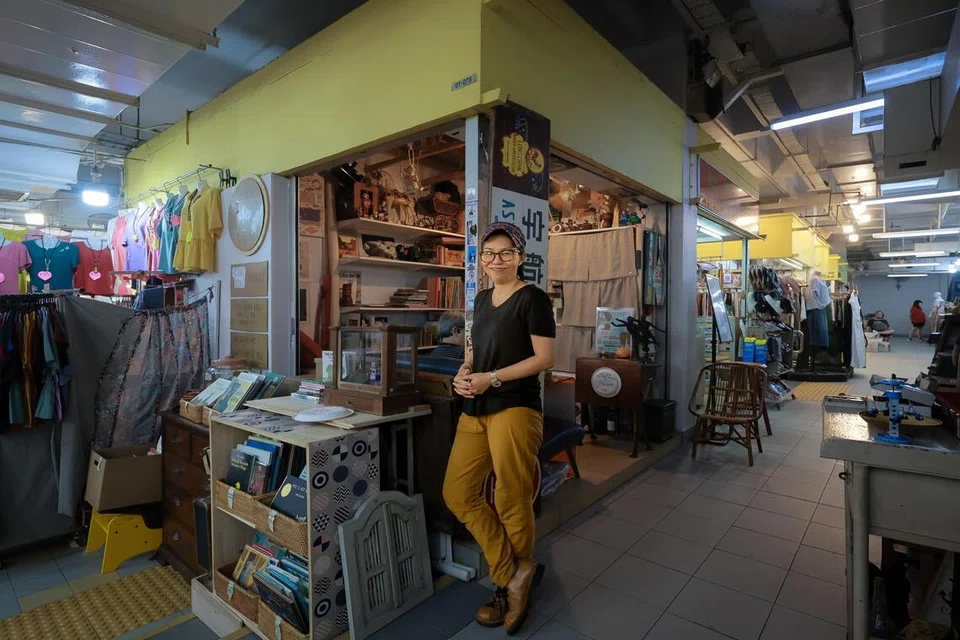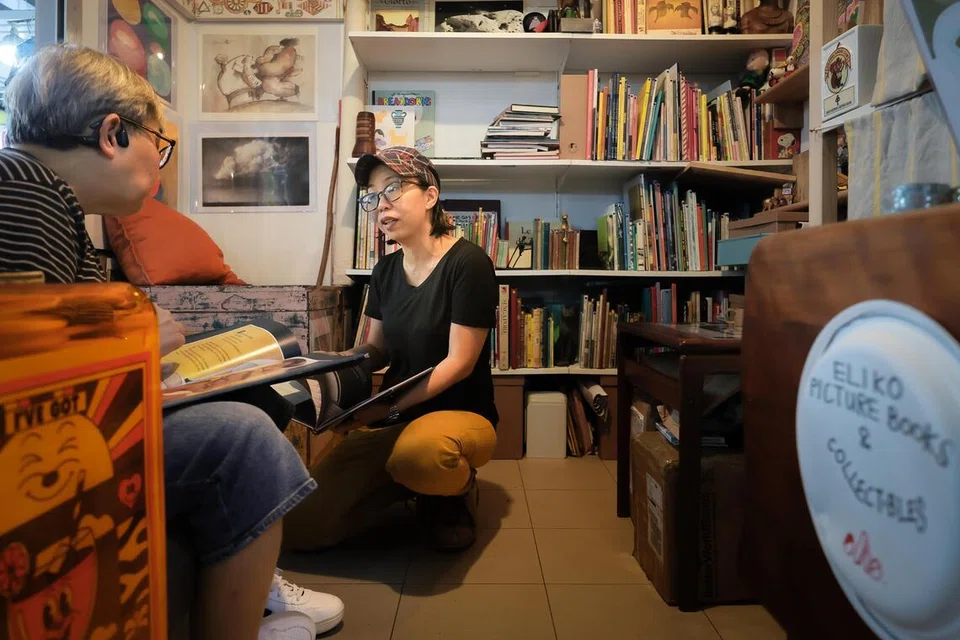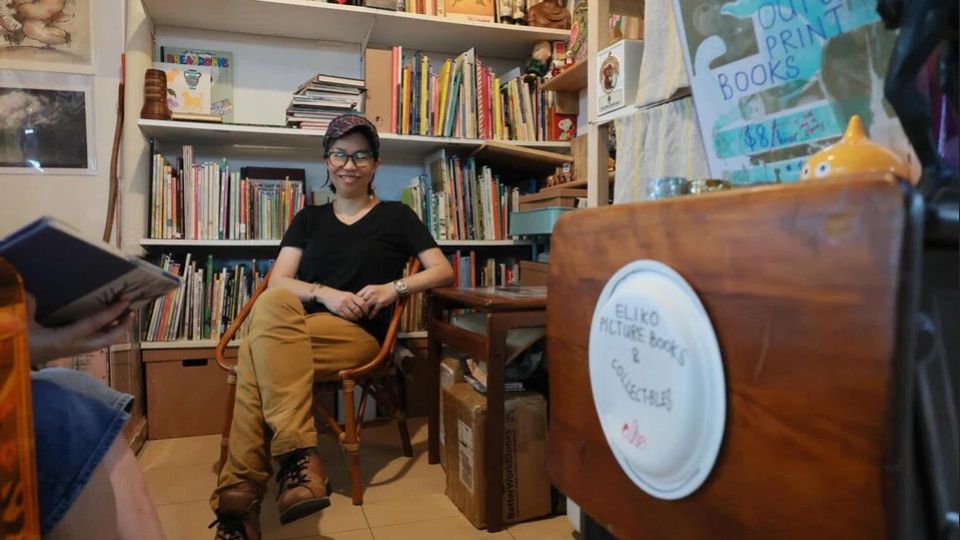November 28, 2025
SINGAPORE – When former business journalist May Lin Au Yong spoke to her family about wanting to open a shop in the ageing Chinatown Complex, there were a few concerned questions.
“Are you sure, sis? Do you plan to sell anything?” her sister asked.
Looking back to November 2024, when she won the tender for the retail space, Ms Au Yong, 48, said it was true that she had not thought it through at the time.
“It was irrational,” she says with a laugh.
She had harboured for some time the idea of opening a sort of paid library, and when she came across the tiny retail spot in the building, she decided to push ahead with a hybrid model – part-shop and part pay-as-you-read library.
Chinatown Complex, built 42 years ago in 1983, is a sprawling mixed-use development best known for housing Singapore’s largest hawker centre.
In among its vast warrens sits Ms Au Yong’s store Eliko Picture Books & Collectibles, likely one of the smallest bookshops in the country.
Measuring just 2.4m by 2.4m – less than half the size of a room in a three-bedroom HDB flat – a retail spot in the complex is typically used to sell sundry goods rather than host a bookshop or library.
It follows in the footsteps of the likes of Dakota Dreams, a bookstore in Old Airport Road Food Centre, and the Casual Poet Library, a pay-to rent community library in Bukit Merah.

Eliko Picture Books & Collectible store is smaller than half the size of a room in a three-bedroom HDB flat. PHOTO: THE STRAITS TIMES
Come, sit, read…for a small fee
Eliko is a name Ms Au Yong coined by blending the name of her first nephew Eli – who was born during the Covid-19 pandemic – with “ko” taken from both her brothers’ names.
The shop opened in April, and for $8, visitors get a cup of coffee and can leaf through books in a corner that is furnished with a small leather lounge chair, stools for children and a storage chest that doubles as seating.
Browsing, of course, is free, and even encouraged because her initial idea was for a pay-as-you-read library outlet, but that later evolved to include a bookshop.
Ms Au Yong said: “I’d rather the books be read. Even if that means they’re no longer new.”
The store carries more than 600 books, but not all are for sale. Newer titles are displayed outside the stall and sold at steep discounts – each book can go for as low as $10.
The shop is also home to Ms Au Yong’s prized collection of rare, vintage picture books amassed over five years, from used-book sellers in London, Italy, Japan, Australia and the United States.
“These aren’t children’s books,” she said, adding that reading picture books is not always a straightforward affair. “Words and images in picture books don’t always align. They work on imagination. I often have to explain that.”
Ms Au Yong is part curator, part storyteller. Customers who step in for a look-see often leave with a new understanding not just of the books, but the craft that goes into making some of them.
Work in progress
Despite its charms, running a niche bookshop in a brutally competitive market can be financially punishing. Ms Au Yong pays about $1,000 a month in rent – low by commercial standards, but steep for a venture that has yet to turn a profit.
“I’m trying to make it work. I’m only now just meeting rent. From April to November, I haven’t made money. It’ll take months more before I can even talk about earning,” she said.
She has drained her retirement savings and relies on freelance work to keep her going.

Eliko Picture Books & Collectibles owner May Lin says her role in the shop is part curator, part storyteller. PHOTO: THE STRAITS TIMES
For instance, she is a part-time lecturer for documentary filmmaking at Lasalle College of the Arts’ Puttnam School of Film and Animation.
She also teaches introductory documentary courses part-time at Singapore Polytechnic, and produces long-form documentaries. This year, she has taken a break from TV work to focus on the shop.
Ms Au Yong is single, has no children or pets, and lives in the family home. She also rents out her HDB flat for extra cash. She counts her blessings as her siblings have stable jobs and her mum has a pension.
“I’m lucky I can afford to be poor. But lucky doesn’t mean I can do this forever. I’m very aware of reality.”
Each day starts with a 45-minute routine – moving a puzzle of boxes, pulling out a 12kg table and making sure everything is just so, and visitors as well as the books they love have breathing room.
The monotony of retail surprised her, she said. “My sister told me that business is about making hundreds of small decisions. She’s right. Even finding bookends that won’t topple took so long.”
Family support
Ms Au Yong said her siblings help out by offering design advice, keeping her from getting carried away with her ideas or just by having brunch together every Saturday.
“Having them around keeps me going,” she said.
She added that someday, she would like to expand, hopefully within Chinatown Complex, if a neighbouring stall becomes available. That could be unlikely – units in the complex rarely change hands, with many held by the same families for the last 40 years.
Right now, the focus is on staying afloat, said Ms Au Yong. She has begun designing postcards, stickers and small collectibles – vintage magazines, matchbox labels, old Singapore photographs – to complement her books.
“Book profit margins are poor. I need to be sustainable,” she added.
Chinatown Complex is expected to close for renovations in 2026 from March to May. That means the bookshop will have to close for three months. “It means losing momentum,” she said.
Meeting people she never expected to meet – book lovers, elderly uncles, curious children, foreigners wandering through the market – remind her why she opened Eliko in the first place, she said.
Said Ms Au Yong: “Picture books take 10 minutes to read, but they open worlds. If I can share that with even a few people, then maybe this irrational idea is worth trying a little longer.”
Eliko is open Thursday to Saturday from 1.30pm to 8.30pm, and from 12.30pm to 4.30pm on Sundays.

